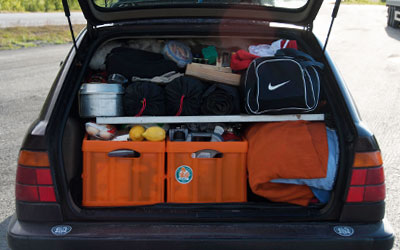
This actually went peu-a-peu. Over a few skype hang sessions, we discussed what we would need , what would be luxury and so on. We bought something here, we bought something there.
It turned out: on the one hand our car was loaded up to the ceiling, wich made packing a bit time intensive. Though the daily Tetris training in the morning get's you going, looking for things in the trunk did eat up some time over the day. But on the other hand I must say: we had a very comfortable ride since we thought of everything (nearly as it would turn out later).
You can basically add anything to your list. Nowadays tons of gadgets are available at your disposal. I tried to crunch the list down the essentials and make a second list with "nice to have" items. So here is a list of essential things you should have at hand for trip around the baltic sea:
- A fire extinguisher (required in some countries). A small one will do (should cost around 20 bucks)
- A gas cooker (you need about 2-3 cartridges). If you cook a lot and cook coffee/tea five times a day you'll need more. You can often get these cartridges at petrol stations along the road. Truck stops usually have all kinds of types in stock (same applies for lost tank caps, spark plugs, oil, lightbulbs, fuses, basic camping equipment, basic car electronics etc).
- Light (anything will do, you just can't have enought of it), we had LED torches and a gas lantern (one cartdrige will get you 5-10 hours depending how bright you put it). However, the light is only needed south of the polar circle during summer since it will stay bright (enough) for 24 hours.
- Spare tires (we had two, on on the roof and one in the originaly trunk position), we needed none of them, but on northern Russian country roads it make sense to have some backup.
- At least somewhat rain proof tents. Something from the 40-60 Euro range will do (did for us). Try to get something that doesn't pack to big. It should have an inner tent with mosquito gaze (Russian mosquitos need really strong repellant and they come in plenty). Get your own tent, it's a bit more packing time in the morning but you can fart as long as you want in the morning without hesitating your neighbours (from an odeur perspective). We had a "throw tent" as a quick sleeping option when we only stopped for a quick sleep (so we had 3 tents for 2 persons) - though this included farting as well.
-
- Tent pegs/stakes. These things you press into the groud to hold your tent. On our trip we packed and raised our tents a couple of times and sooner or later you'll loose/forget some of them. Also in combination with a rope and plastic sheet, you can build improvised and formidable places to hang out during bad weather.
- A halfway decent "sleeping bag", the 80-100 EUR price range is a good place to look. You can easily pay 500 bucks for one, but the indicated price range should really do during summer and nights down to 2-3 °C (near freezing point). Keep in mind that you'll also have nights with mild temperatures up to 10-15°C. If you fear freezing - pack some long ski underwear.
- A good knive (for each person). You always need a good knive. Better pack two. One for eating and one utility knive for each person (you know, it's nice not having to wait for the guy with the knive to prepare your marshmallow stick).
- Some pots (big & small) and pan for cooking, a plate, fork, spoon, cup ... you know, an army set or something will do.
- Drinking Water (seriously, you'll use up more than you think when you do wild camping). Get the big canisters with 5L (~1,3 Gallons). Have one in spare and one open. That's a good rule of thumb.
- Water Tank, we had a 15l water tank on the roof. We used this water to wash hands, clean the dishes and so on. Here we used water from lakes, glaciers or tab water. They work for drinking water, but older ones tend to give a taste of plastic to the water. So get new ones.
- Duct-Tape (one roll should do). Get the good one, you'll need it somewhere down the road. Definitely!
- A rope (we had 40m of a light one that could hold up to 250KG (wich is enough for most improvisation needs). A rope is always handy, get a strong one for pulling a car and a light one for things like putting up tents and alike.
- An axe (we didn't had one, very handy if you like to start a fire somewhere in the middle of nowhere). You might also consider a jack saw (panel saw) - which we didn't had as well. What we had was a kind of hand chainsaw from a 10 bucks survival kit ... it worked remarkably well, though it will not last as replacement for two weeks.
- Gasoline spare canister. We had a total spare capacity of 15 liters on the roof (that would give us a pessimistic 100km extra distance)
- A folding shovel (to dig holes ... mainly for your morning dump).
- Self inflating isolation/camping mattress
- Medical Pack. Pack a few basic things. Badges, something to desinfect wounds, pain killers, something against diarrhea and fever, condoms and so on. Ask your doctor or pharmacy. They'll gladly help you with a useful list.
- Spare Parts. This depends a little on your car. The minimum should be a set of car fuses (matching your car) and spare light bulbs. These usually come in sets/boxes at your local DIY market for little money.
Last modified: 26.03.2018, edited by: Nils



